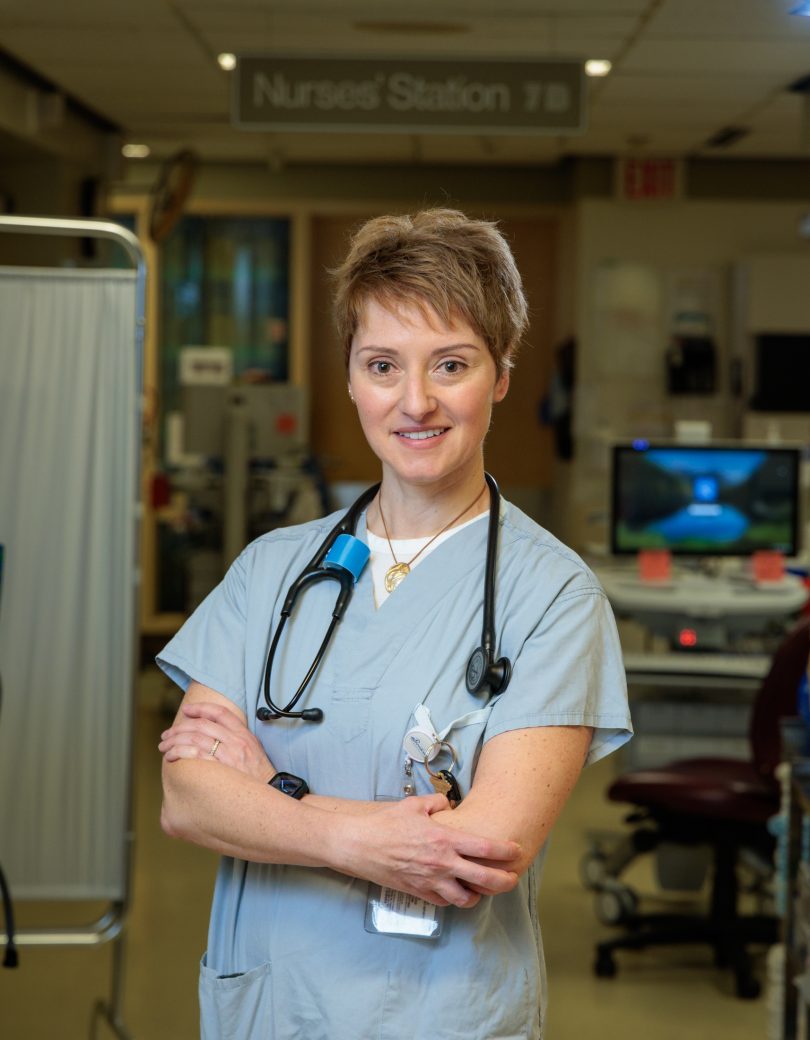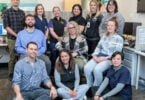National Nursing Week in Canada runs until May 14. At Providence Health Care, close to 3,000 nurses, representing a broad range of roles and disciplines across numerous sites care for hundreds of patients and residents every day. To mark this week, we’re profiling five of the many nurses who play such a vital role in the well-being of those Providence serves. This week we introduced Clinical Nurse Specialist PJ Matras and Registered Nurse Liji Mathew. Today, meet Alina Steinberg.
As a Nurse Practitioner at St. Paul’s Hospital, Alina Steinberg’s job description is different from other nursing disciplines.
With the autonomy to diagnose, treat and manage acute and chronic physical and mental illnesses, she does everything that a general practitioner physician does, but through a nursing lens.
“Nurse Practitioners (NPs) have the same scope of practice as physicians do in primary care,” says Steinberg. “It is a very distinct position.”
Being a strong patient advocate
What appealed to her about the NP role was the clinical autonomy of the position. “I knew I could achieve more for patients if I could diagnose, refer, prescribe and medically manage them independently,” she says. “As an NP I’m able to be an even stronger advocate for every one of my patients.”
She adds: “I don’t know the evolving scope of all nursing roles, but what I know for sure is no other nursing role carries as much clinical autonomy, with the ability to practice medicine, as the NP role.”
In Providence and other BC health authorities, Nurse Practitioners are members of medical staff within their organization and have their own department.
“Our licence gives us the independence to provide for our patients as the ‘Most Responsible Provider’ with the ability to admit and discharge patients,” explains Steinberg.
Nursing not her original career choice
A career in nursing wasn’t Steinberg’s first choice after high school. She initially worked in computer science and finance.
But the lure of nursing was strong, motivated by a commitment to helping patients. “Finance was not for me,” she recalls. “I was really meant to work in the medical field.”
She studied at the University of British Columbia to become a Registered Nurse. Then, learning about the broader range of work and responsibilities of the NP, she obtained an NP masters degree from UBC. She also obtained post-NP graduate certification in acute care for adults through the University of Toronto.
Thriving on job autonomy
Now in her fifth year of working with the Internal Medicine program at St. Paul’s, Steinberg cares for a wide variety of patients and thrives on the independence the role gives her to make a significant impact on their health and outcomes.
“I learn something new in this role every day, whether it’s from reviewing clinical research or collaborating with the great team of Internal Medicine specialists on our service,” she says.
Treating patients with complex medical needs
Steinberg understands the important role she plays in continuity of care for patients and the complex conditions that many are struggling with.
“The majority of the patients we care for have mental health comorbidities and are substance users,” she adds, acknowledging that this added complexity requires ongoing communication with a team of health care professionals to help people make a smooth transition back to their community.
Her work and increasingly complex patient population keeps Steinberg stimulated and continually learning new things.
“Because Internal Medicine is the largest service in the hospital, I have a wide range of patient ages and conditions, from those presenting with new acute conditions to others with acute problems on top of ongoing chronic conditions.”
While her work as an NP is fulfilling in itself, she still appreciates when a patient or a family takes a minute to say thanks.
One particularly touching recent gesture involved a patient making a substantial donation to the St. Paul’s Foundation on her behalf. That led to the purchase of a new ice machine for the Medicine program (some surgical and other types of patients require ice therapy).
“Working in a hospital in this role is amazing,” she says. “I love my job.”





